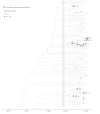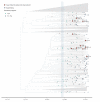Investigation of an international water polo tournament in Czechia as a potential source for early introduction of the SARS-CoV-2 Omicron variant into Belgium, Switzerland and Germany, November 2021
- PMID: 37943503
- PMCID: PMC10636743
- DOI: 10.2807/1560-7917.ES.2023.28.45.2300018
Investigation of an international water polo tournament in Czechia as a potential source for early introduction of the SARS-CoV-2 Omicron variant into Belgium, Switzerland and Germany, November 2021
Abstract
BackgroundThe earliest recognised infections by the SARS-CoV-2 Omicron variant (Pango lineage B.1.1.529) in Belgium and Switzerland suggested a connection to an international water polo tournament, held 12-14 November 2021 in Brno, Czechia.AimTo study the arrival and subsequent spread of the Omicron variant in Belgium and Switzerland, and understand the overall importance of this international sporting event on the number of infections in the two countries.MethodsWe performed intensive forward and backward contact tracing in both countries, supplemented by phylogenetic investigations using virus sequences of the suspected infection chain archived in public databases.ResultsThrough contact tracing, we identified two and one infected athletes of the Belgian and Swiss water polo teams, respectively, and subsequently also three athletes from Germany. In Belgium and Switzerland, four and three secondary infections, and three and one confirmed tertiary infections were identified. Phylogenetic investigation demonstrated that this sporting event played a role as the source of infection, but without a direct link with infections from South Africa and not as a superspreading event; the virus was found to already be circulating at that time in the countries involved.ConclusionThe SARS-CoV-2 Omicron variant started to circulate in Europe several weeks before its identification in South Africa on 24 November 2021. Accordingly, it can be assumed that travel restrictions are usually implemented too late to prevent the spread of newly detected SARS-CoV-2 variants to other regions. Phylogenetic analysis may modify the perception of an apparently clear result of intensive contact tracing.
Keywords: B.1.1.529; COVID-19; Omicron; SARS-CoV-2; contact tracing; epidemiology; phylogenetics; viral spread.
Conflict of interest statement
Figures







Similar articles
-
Performance of the Swiss Digital Contact-Tracing App Over Various SARS-CoV-2 Pandemic Waves: Repeated Cross-sectional Analyses.JMIR Public Health Surveill. 2022 Nov 11;8(11):e41004. doi: 10.2196/41004. JMIR Public Health Surveill. 2022. PMID: 36219833 Free PMC article.
-
Mapping the Early Dispersal Patterns of SARS-CoV-2 Omicron BA.4 and BA.5 Subvariants in the Absence of Travel Restrictions and Testing at the Borders in Europe.Viruses. 2022 Dec 31;15(1):133. doi: 10.3390/v15010133. Viruses. 2022. PMID: 36680171 Free PMC article.
-
Estimating the effect of South Africa travel restrictions in November 2021 on the SARS-CoV-2 Omicron outbreak in the Netherlands: a descriptive analysis and modelling study.BMJ Open. 2025 May 21;15(5):e089610. doi: 10.1136/bmjopen-2024-089610. BMJ Open. 2025. PMID: 40398937 Free PMC article.
-
Molecular evolution of SARS-CoV-2 from December 2019 to August 2022.J Med Virol. 2023 Jan;95(1):e28366. doi: 10.1002/jmv.28366. J Med Virol. 2023. PMID: 36458547 Free PMC article. Review.
-
Challenges of SARS-CoV-2 Omicron Variant and appropriate countermeasures.J Microbiol Immunol Infect. 2022 Jun;55(3):387-394. doi: 10.1016/j.jmii.2022.03.007. Epub 2022 Apr 26. J Microbiol Immunol Infect. 2022. PMID: 35501267 Free PMC article. Review.
References
-
- World Health Organization (WHO). Timeline: WHO's Covid-19 response. Geneva: WHO. [Accessed: 18 Oct 2023]. Available from: https://www.who.int/emergencies/diseases/novel-coronavirus-2019/interact...
-
- World Health Organization. Coronavirus (COVID-19) dashboard. Geneva: WHO. [Accessed: 19 Oct 2023]. Available from: https://covid19.who.int
-
- European Centre for Disease Prevention and Control (ECDC). SARS-CoV-2 variants of concern as of 12 May 2022. Stockholm: ECDC; 2022. Available from: https://www.ecdc.europa.eu/en/covid-19/variants-concern
MeSH terms
Supplementary concepts
LinkOut - more resources
Full Text Sources
Medical
Miscellaneous
